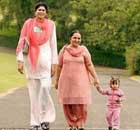Foreign and Military Affairs
Hopes are high as Hu heads for nuclear meet
By Tan Yingzi and Wu Jiao (China Daily)
Updated: 2010-04-12 07:09
 |
Large Medium Small |
Washington summit aimed at deterring nuke terrorism
WASHINGTON - President Hu Jintao leaves Beijing Monday on a 10-day, four-nation trip to attend the Nuclear Security Summit in Washington and cement relations with emerging South American economies.
Hu will be among some 40 heads of state and representatives of the United Nations, the International Atomic Energy Agency and the European Union attending the nuclear summit initiated by US President Barack Obama. The summit is mainly aimed at deterring nuclear terrorism, which the US considers a top threat to its national security.
Kenneth Luongo, president and founder of the Partnership for Global Security and co-chair of the Fissile Materials Working Groups (FMWG) - a group of more than 40 leading nuclear security and non-proliferation experts - said: "It is enormously important that Hu is coming. It shows China's commitment to the prevention of nuclear terrorism and to nuclear security not just in the country but globally."
Fu Mengzi, an expert on Sino-US relations, said China - as a "notable nuclear power" and a permanent member of the UN Security Council - has a special responsibility to prevent nuclear threats.
US nuclear experts said they hope to see more cooperation between China and the United States in this area.
"China has done a lot (in nuclear security) and there is more to do. I would like to see cooperation between China and the United States grow beyond cooperation between civilian agencies and include military agencies," said Professor Matthew Bunn of Harvard University's John F. Kennedy School of Government, co-principal investigator for the Project on Managing the Atom.
China is very important to the US and the world, said Alexandra Toma, a nuclear security expert with the group Connect US Fund. "The Chinese can bring their expertise and experience into the discussion."
However, some Chinese nuclear experts consider the summit a means by which the US will press other nuclear countries, including China, for more compromises in their nuclear arms strategies.
The US signed a landmark disarmament treaty with Russia on Thursday, and according to Zhang Xiaodong, deputy chief of the Chinese Association for Middle East Studies, the agreement now pushes the status of other nuclear countries, including China, into the limelight.
The US is trying to gain the upper hand to press others to follow suit, said Wu Miaofa, an analyst at the China Institute for International Studies.
The US and Russia vowed to limit their nuclear warheads to 1,550 each over the next seven years.
"Even as the US pledges a 'nuclear-free world', it has announced plans to spend billions of dollars in updating its nuclear laboratory and advance its missile defense system which has prompted some countries to seek to develop their missile systems and nuclear weapons," Wu said.
China put forward a non-nuclear policy 46 years ago, and other countries should learn from it, said Wu.
China advocated as early as in 1964 - the year it tested its first nuclear bomb - that the world's nuclear weapons be destroyed completely. China also pledged that it would not use its nuclear weapons first and will not use them against countries without nuclear capability.
Hu will leave for Brasilia from the US to attend the Brazil-Russia-India-China (BRIC) summit April 14, and also visit Venezuela and Chile.
China Daily











